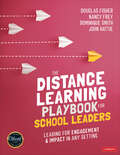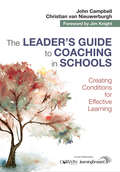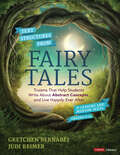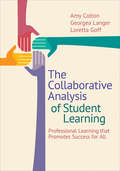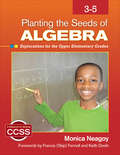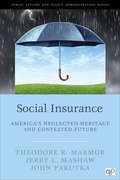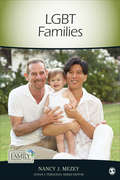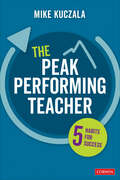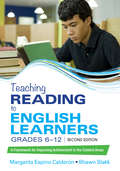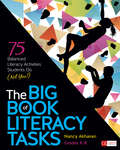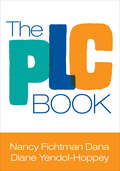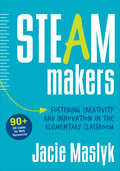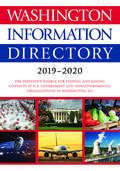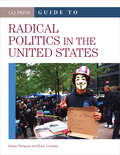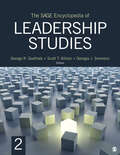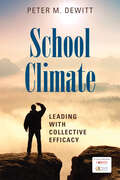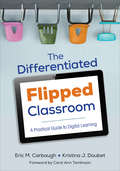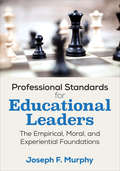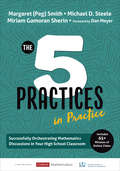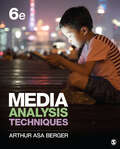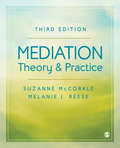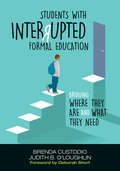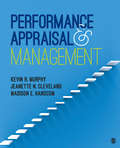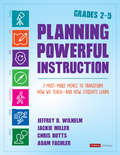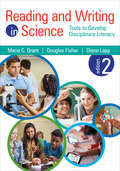- Table View
- List View
The Distance Learning Playbook for School Leaders: Leading for Engagement and Impact in Any Setting
by Douglas Fisher Nancy Frey John Hattie Dominique SmithEffective school leadership is effective leadership, regardless of where it occurs In March 2020, there was no manual for leading schools and school systems during a pandemic. School leaders had to figure things out as the crisis unfolded. But starting now, leaders have the opportunity to prepare for leading schools through distance learning with purpose and intent—using what works best to accelerate students’ learning all the while maintaining an indelible focus on equity. Harnessing the insights and experience of renowned educators Douglas Fisher, Nancy Frey, and John Hattie, The Distance Learning Playbook for School Leaders applies the wisdom and evidence of the VISIBLE LEARNING® research to understand what works best. Spanning topics from school climate at a distance, leader credibility, care for self and colleagues, instructional leadership teams, stakeholder advisory groups, and virtual visibility, this comprehensive playbook details the research- and evidence-based strategies school leaders can mobilize to lead the delivery of high-impact learning in an online, virtual, and distributed environment. This powerful guide includes: Actionable insights and hands-on steps for each module to help school leaders realize the evidence-based leadership practices that result in meaningful learning in a distance environment Discussion of equity challenges associated with distance learning, along with examples of how leaders can work to ensure that equity gains that have been realized are not lost. Analysis of the mindsets that empower leaders to manage change, rather than technology Space to write and reflect on current practices and plan future leadership strategies The mindframes for distance learning that serve leaders well in any instructional setting and will position schools after the pandemic to come back better than they were before The Distance Learning Playbook for School Leaders is the essential hands-on guide to leading school and school systems from a distance and delivering on the promise of equitable, quality learning experiences for students.
The Leader′s Guide to Coaching in Schools: Creating Conditions for Effective Learning
by John Campbell Christian van NieuwerburghGrow your leadership skills to bring out the best in your school! Hallways, parking lots, staff rooms—these are all places where you and your staff have conversations every day. What if you could use these opportunities to build your staff’s resiliency and empower them to reach their goals. The Leader’s Guide to Coaching in Schools offers a proven, accessible, and usable framework to increase your interpersonal effectiveness and grow your ability to coach your staff to overcome obstacles and create their own solutions. Coaching experts John Campbell and Christian van Nieuwerburgh demonstrate how coaching is not just for formal coaching relationships, but how a coaching approach can be applied throughout a school day to create a culture of growth. Through sample questions, video examples, and tools this step-by-step guide shows you how to: Introduce a coaching approach into a wide range of conversational contexts Use the GROWTH coaching conversation framework to improve both staff and student success and well-being Use coaching approaches in areas that school leaders typically find challenging: in formal performance reviews, when giving informal feedback, and when working with teams Help your staff get "unstuck" no matter what challenges they are facing by using solutions-focused coaching techniques that help them envision desired outcomes and the actions needed to achieve them. "The GROWTH coaching model should be in every administrator’s hand as their bible for school improvement. Having this guide will guarantee success and getting the best out of all stakeholders." —Elizabeth Alvarez, Principal John C. Dore Elementary, Chicago, IL "The book is just what the doctor ordered for busy leaders—short and concise." —B.R. Jones, Superintendent of Education Tate County School District, Senatobio, MS
Text Structures From Fairy Tales: Truisms That Help Students Write About Abstract Concepts . . . and Live Happily Ever After, Grades 4-12 (Corwin Literacy)
by Gretchen Bernabei Judith A. ReimerStandardized tests and college essay prompts demand that students produce quality analytical writing about abstract concepts. But how do you actually teach this kind of writing? Award-winning authors Gretchen Bernabei and Judi Reimer make it easy and fun. This book includes 35 engaging lessons that give students just the focused practice they need to craft effective, analytical writing for any situation. Centered on classic fairy tales and designed for students of all ages, each lesson includes a writing prompt accompanied by a planning framework. Students write a truism, select or create a text structure, and write a kernel essay that serves as scaffolding for a detailed rhetorical piece. With practice, students move from depending on teacher guidance to becoming autonomous analytical writers. The teacher-friendly layout and built-in flexibility of the book empower you to Use each fairy tale lesson for reading, for writing, or for both Cluster lessons around a particular literacy concept or use each as a standalone lesson Pair fairy tales thematically with other readings Customize the text structure options to meet the needs of your individual students Encourage students to create their own text structures Teach students simple ways to expand their ideas into detailed, rich essays Additional ideas for how to use the lessons, a complete collection of text structures, craft lessons on revision, and a list of conversation strategies are also included. Put Text Structures From Fairy Tales to work in your classroom and soon your students will be writing happily ever after.
The Collaborative Analysis of Student Learning: Professional Learning that Promotes Success for All
by Amy B. Colton Georgea M. Langer Loretta GoffA proven approach to transformative professional learning that raises achievement for all students! Does professional learning at your school promote teacher growth and propel student achievement? If you’re ready for a change, turn to trusted educators Colton, Langer, and Goff, pioneers of an extraordinarily effective design for professional learning: Collaborative Analysis of Student Learning (CASL). You’ll find complete strategies, resources and more in this evidence-based book that addresses the Common Core State Standards. Learn how to: Benefit from the lessons learned by the authors over two decades of nationwide implementation as you design a sustainable CASL program that drives positive change at your school Inquire into student work and assessments to promote learning excellence for all Use the CASL Teacher as Collaborative Inquirer framework to promote culturally competent, academically rigorous teaching Develop and implement new instructional strategies that mesh with Common Core standards Discover how to put CASL in place at your school, helping faculty – and students – to reach their full potential. "This book is extraordinary and a must have for every practitioner striving to improve student learning! Colton, Langer, and Goff provide explicit guidance on building a culture of collaborative inquiry to empower teachers and leaders to explore their own practices in a way that fosters meaningful and relevant learning for students." Victoria Duff, Coordinator of Professional Learning New Jersey Principal and Supervisors Association "Teacher collaborative professional learning leads to improved teaching and student learning when it is skillfully orchestrated. In this book, Colton, Langer, and Goff provide an essential resource rich with strategies, tactics, tools, and examples to guide both facilitators and team members to structure collaborative inquiry, analysis, and learning in ways that deepen their learning and practice and increase results for all students." Joellen Killion, Senior Advisor Learning Forward
Planting the Seeds of Algebra, 3-5: Explorations for the Upper Elementary Grades
by Monica M. NeagoyGive your students a foundation of algebra for math success – now and in the future! Algebra is not something to be feared, but something to be embraced with a sense of wonder. Planting the Seeds of Algebra, 3-5, introduces algebra as an accessible way of seeing the world that is necessary to our students’ futures. Students and teachers must become friendly with algebraic foundations, as they have increasingly become the gateway to careers in the STEM fields. Monica Neagoy empowers teachers with theoretical and practical ways to introduce Algebra to 3-5 grade students, making vital connections to concepts they will encounter in middle school and beyond. You’ll discover Four explorations to help you weave key algebraic ideas into everyday mathematics Step-by-step lessons from real classrooms that will guide you in teaching concepts and in establishing their relevance and applicability New teaching methods that break down difficult algebraic concepts and build a critical foundation for higher math Awaken new awareness and change attitudes by sowing the seeds for a vibrant, useful, and rich experience with mathematics. "While reading this book I experienced the sense of wonder and aha moments alongside the students themselves. This book will move your faculty to new depths of understanding about mathematics and will instill the passion to explore a myriad of algebraic concepts." — Bob Weiman, Director St. Stephen’s & St. Agnes School "She’s done it again! Monica Neagoy has authored another book that deftly presents important foundations of algebra while celebrating mathematics through carefully crafted explorations, all of which include student and teacher vignettes and comments about the mathematics they have learned and are teaching. Wow. When I read this book I felt like I was in a classroom!" — Francis (Skip) Fennell, McDaniel College Past President of the National Council of Teachers of Mathematics
Social Insurance: America’s Neglected Heritage and Contested Future (The Institution for Social and Policy Studies )
by Jerry L. Mashaw Theodore R. Marmor John R. PakutkaWhat has America done to protect its citizens from life-changing but common risks such as death of a family breadwinner, ill health, disability, involuntary unemployment, outliving retirement savings, and birth into a poor family? Each, in its own way, burdens—and possibly devastates—unlucky individuals and families both emotionally and financially. It is the rare life that is untouched by one or more of these six threats. How do our current policies affect taxation, spending, and the economy, as well as prospects for individual lives? What more might these policies do to protect Americans? Rich in stories, data, and analysis, Social Insurance provides a strong intellectual foundation for understanding the history, economics, politics, and philosophy of America’s most important social insurance programs. This insightful work provides a unifying vision of these programs’ purposes and reminds us, amidst the confusing and often apocalyptic rhetoric, why we have the programs and policies we do, while arguing for reforms that preserve and enhance the protections in place.
LGBT Families (Contemporary Family Perspectives (CFP))
by Nancy J. MezeyPart of the SAGE Contemporary Family Perspective series, this book presents a comprehensive yet accessible understanding of lesbian, gay, bisexual, and transgender families today by drawing upon and making sense of the burgeoning scholarly literature about LGBT families from the late twentieth and early twenty-first centuries. It pays particular attention to how structures of race, class, gender, sexuality, and age shape LGBT families, and how members of such families negotiate the social landscapes within which they exist. The book will help readers better understand the formation, experiences, challenges, and strengths of LGBT families, and address two main questions: Why are new family forms so threatening to certain groups of people in society? and How are new family forms beneficial to the society in which they exist? Here is what author Nancy Mezey had to say in a recent interview: ? "LGBT people are creating families in a society that simultaneously demonizes and embraces them. With a desire to understand and perhaps deconstruct this rocky terrain, I decided to write LGBT Families, a comprehensive overview based on solid research so that readers can form their own opinions." "This book stands in solidarity with all diverse family forms – families that developed out of particular social and economic contexts, and that contribute to the society around them, despite the hardships that some in society may level at them."
The Peak Performing Teacher: Five Habits for Success
by Michael S. KuczalaDevelop and implement an action plan for self-care Cultivating focus, re-energizing oneself, and improving daily habits are essential for educators’ well-being and the good that they pass along to students. Mike Kuczala asserts that educators’ greatest tool is a mirror—in it, teachers will find their greatest advocate for personal growth, power, wellness, and vision: themselves. However, finding the time to implement new habits can be hard. Because small changes are easier to plan for and realize, Kuczala concentrates on the habits that are most likely to yield significant improvements. This book guides educators in meaningful self-reflection by providing: Five critical practices to increase productivity and decrease anxiety Reflection prompts and vignettes to guide readers in developing self-care strategies Practical checklists and templates to help educators maintain goals Grounded in new research connecting personal change to professional improvement, Kuczala’s approach to well-being builds a bridge between mind and body to create a comprehensive path for success.
Teaching Reading to English Learners, Grades 6 - 12: A Framework for Improving Achievement in the Content Areas
by Margarita Espino Calderon Shawn M. Sinclair-SlakkRetool your whole school for EL achievement For any student, middle and high school can be challenging. But for an English learner or striving reader—and the myriad words, phrases, syntax, texts, and concepts they must negotiate on a daily basis—the stakes seem a whole lot higher. Fortunately for content-area teachers, Margarita Calderón and Shawn Slakk make available in a single resource all the best instructional and professional development combinations for expediting comprehension across the secondary grades. Really a tool to assist all learners across all language needs, the second edition of Teaching Reading to English Learners, Grades 6-12, provides evidence-based strategies for helping content-area teachers and schools at large: Teach academic language in all subject areas Embed discourse practice through interaction strategies Integrate basic and close reading comprehension skills into lessons Teach drafting, revising, and editing for content-specific writing Use cooperative learning to develop social emotional skills and enhance academic achievement Calderón and Slakk know firsthand that if we’re to counter the commonly held narrative of predictable failure among our ELs, it takes a whole school, and they have the evidence to prove it. Read Teaching Reading to English Learners, Grades 6-12, implement its strategies across all classrooms, and soon enough you, too, will maximize the comprehensions skills so critical to our ELs’ long-term success.
The Big Book of Literacy Tasks, Grades K-8: 75 Balanced Literacy Activities Students Do (Not You!) (Corwin Literacy)
by Nancy AkhavanThe Comprehensive Handbook for Scaffolding Students’ Literacy Growth Our readers and writers must "do the doing" if they are to succeed. In The Big Book of Literacy Tasks, Nancy Akhavan offers an instructional plan designed to yield independent effort and engagement. 75 tasks in beautiful full-color two-pagers ensure gradual release by moving more swiftly from the "I do" teacher phase to the "you do," when students benefit from the healthy amount of struggle that is the hallmark of learning. (And spoiler alert: you kick the habit of hovering, over-explaining, and rescuing!) Backed by research and thoughtfully arranged to make day-to-day planning easier, this groundbreaking book provides: Reading and writing tasks organized into 3 sections—everyday skills, weekly practices, and sometime engagements requiring greater complexity Mini-lessons that are essential— whether you use a reading program, a workshop approach, or are just transitioning to Balanced Literacy Colorful teaching charts allowing you to quickly grasp the high points of each lesson A clear task structure for introducing and managing the stages as you move students toward independent practice Mid-task "Watch Fors" and "Work Arounds" showing how to coach without risking helicopter teaching Amazing scaffolding tips for meeting the needs of a range of learners Sample student work that offers valuable insights on how to use the tasks as formative assessments Practical and engaging, The Big Book of Literacy Tasks gives you a clear framework for "working the minds" of your students, helping them forge their own path to becoming better readers and writers.
The PLC Book
by Diane Yendol-Hoppey Nancy Fichtman DanaThe secret to your PLC’s success? You. Commitment to improving student outcomes is a natural part of being a teacher. So when you bring your experience, skills, and questions to a professional learning community, you help shape the future of the team—and that makes all the difference for your students. Unlike other PLC resources, this book isn’t just for leaders—it’s designed to help every member of the team be a driving force for success. With it, you’ll work together to Give voice to important issues and dilemmas Decide where to focus your work Develop and implement a plan for gaining insight into your area of focus Take action based on individual and collective learning Share results with others outside the PLC Successful PLCs buzz with a collaborative energy that comes from the engagement of teachers. With this guide, you’ll make the most of your contributions. "The PLC Book is an essential resource for all principals and teachers who wish to create a powerful culture of adult and student learning in their schools. . . . A must-read for all who are currently engaging in or wish to begin Professional Learning Communities in their schools." - Todd Whitaker, Professor Indiana State University "The PLC Book is destined to be an essential text in the fields of teacher education, teacher professional development, school administration and a handbook for teachers and others engaged in the pursuit of systemic educational change." - Frances Rust, Senior Fellow & Director of Teacher Education Program University of Pennsylvania
STEAM Makers: Fostering Creativity and Innovation in the Elementary Classroom
by Jacie MaslykBuild the essential 4—creativity, collaboration, communication, and critical thinking! Go beyond theory and find out how to systematically integrate STEAM and Makerspaces that prepare students for real-world experiences. This engaging resource outlines step-by-step processes to help anyone start their STEAM and Maker journey. Charts, checklists, web links, student stories and teacher challenges help you make meaningful subject area connections and tap your students’ natural curiosity. District and school leaders will learn to: Develop dedicated makerspaces Integrate STEAM and Making into daily practice Differentiate instruction for all learners Promote a growth and design culture Create a STEAM Maker network Align with core standards and The Next Generation Science Standards Get students to think more creatively and collaboratively and see them become more engaged in learning that’s both challenging and fun. This go-to-guide shows you how! "More than ever before, schools are being called on to create cultures of innovation, moving to learning that is personalized, relevant, and full of rigorous and authentic opportunities for all students. STEAM Makers provides invaluable insight into the necessary shifts in instructional pedagogy needed to create learning environments and opportunities that are future ready." Thomas C. Murray Future Ready Schools, Alliance for Excellent Education "This book will make you want to be better for kids. With compelling examples, provocative questions, and a pragmatic roadmap, STEAM Makers cuts through the jargon and offers readers a vision of the future of education. Jacie Maslyk masterfully empowers readers to be dreamers and change-makers." Dr. Brad Gustafson Elementary Principal, Digital Innovation in Learning Award (DILA) winner
Washington Information Directory 2019-2020
by Cq PressThe Washington Information Directory is the essential one-stop source for information on U.S. governmental and nongovernmental agencies and organizations. This thoroughly researched guide provides capsule descriptions that help users quickly and easily find the right person at the right organization. The Washington Information Directory offers three easy ways to find information: by name, by organization, and through detailed subject indexes. Although it is a "directory, the volume is topically organized, and within the taxonomic structure the relevant organizations are listed not only with contact information but with a brief paragraph describing what the organization (whether government or nongovernmental) does related to that topic. It is focused on Washington—in order to be listed, an organization must have an office in the Washington metropolitan area. These descriptions are not boilerplate advertising material from the organizations; rather, they are hand-crafted by a talented freelance research team. In addition, the Washington Information Directory pulls together 55 organization charts for federal agencies, congressional resources related to each chapter topic, hotline and contact information for various specific areas of interest (from Food Safety Resources to internships in Washington), and an extensive list of active congressional caucuses and contact details. It has two appendices, one with thorough information on congresspersons and committees, and the second with governors and embassies. With more than 10,000 listing and coverage of the new presidential administration, the 2019–2020 Edition features contact information for the following: • 116th Congress and federal agencies • Nongovernmental organizations • Policy groups, foundations, and institutions • Governors and other state officials • U.S. ambassadors and foreign diplomats • Congressional caucuses
CQ Press Guide to Radical Politics in the United States
by Susan R. Burgess Kathryn C. LeemanThe CQ Press Guide to Radical Politics in the United States is a unique work which provides an overview of radical U.S. political movements on both the left and the right sides of the ideological spectrum. It focuses on analyzing the origins and trajectory of the various movements, and the impact that movement ideas and activities have had on mainstream American politics. This guide is organized thematically, with each chapter focusing on a prominent arena of radical activism in the United States. These chapters will: Trace the chronological development of these extreme leftist and rightist movements throughout U.S. history Include a discussion of central individuals, organizations, and events, as well as their impact on popular opinion, political discourse, and public policy Include sidebar features to provide additional contextual information to facilitate increased understanding of the topic Seeking to provide an accessible, balanced, and well-documented discussion of topics often overlooked in political science, this book includes an introduction to anarchism, communism, and socialism as well as the Chicano movement, civilian border patrols, Black power, the Ku Klux Klan, ACT-UP, the militia movement, Occupy Wall Street, farmers’ rebellions, Earth First!, the Animal Environmental Liberation Front, and many others.
The SAGE Encyclopedia of Leadership Studies
by George R. Goethals Georgia J. Sorenson Scott Townsend AllisonLeadership Studies is a multi-disciplinary academic exploration of the various aspects of how people get along, and how together they get things done. The fields that contribute to leadership studies include history, political science, psychology, anthropology, sociology, philosophy, literature, and behavioral economics. Leadership Studies is also about the ethical dimensions of human behavior. The discipline considers what leadership has been in the past (the historical view), what leadership actually looks like in the present (principally from the perspectives of the behavioral sciences and political science), and what leadership should be (the ethical perspective). The SAGE Encyclopedia of Leadership Studies will present both key concepts and research illuminating leadership and many of the most important events in human history that reveal the nuances of leadership, good and bad. Entries will include topics such as power, charisma, identity, persuasion, personality, social intelligence, gender, justice, unconscious conceptions of leadership, leader-follower relationships, and moral transformation.
School Climate: Leading With Collective Efficacy
by Peter M. DeWittBuild a positive school climate to impact students, teachers, and the community! Is improving school climate on your to-do list? Do you think about it as a top-down directive or as a dialogue to build equity within the school? A healthy school environment should never be seen as an option, but instead supported as a must-have. Peter DeWitt offers leaders practical high impact strategies to improve school climate, deepen involvement in student learning, and engage a broader family network. In addition to international vignettes focused on community stakeholders and research-based practices, this book features tools such as: • A leadership growth cycle to help leaders build their self-efficacy • A teacher observation cycle centered on building collective efficacy • An early warning system to identify potential at-risk students • Action steps following each chapter to apply to your own setting • Discussion questions for use in team environments Establishing a supportive and inclusive school climate where professionals can take risks to improve the lives of students is vital to maximize learning in any school community. "This is a fabulous book by a renowned expert in the field of leadership. Peter DeWitt explains the complex and credible in a way that is thought-provoking, challenging and inspiring. I love how he gives insights in what successful collaborative leadership is and shows how we can all build our skills and mindset for leading towards collective efficacy." —James Nottingham, Challenging Learning author and creator of #TheLearningPit JN Partnership LTD, Northumberland, United Kingdom
The Differentiated Flipped Classroom: A Practical Guide to Digital Learning (Corwin Teaching Essentials)
by Eric M. Carbaugh Kristina J. DoubetEnsure personalized student learning with this breakthrough approach to the Flipped Classroom! In the flipped classroom, students need to do more than simply re-watch a video to learn effectively. This groundbreaking guide helps you identify and address diverse student needs within the flipped classroom environment. You will find practical, standards-aligned solutions to help you design and implement carefully planned at-home and at-school learning experiences, all while checking for individual student understanding. Learn to differentiate learning for all students with structured, research-based best practices to help you: Integrate Flipped Learning and Differentiated Instruction Use technology as a meaningful learning tool Implement flexible planning and grouping Proactively use ongoing formative assessments Adjust instruction to support, challenge, and motivate diverse learners Manage the Differentiated Flipped classroom Includes practical examples and a resource-rich appendix. Make your flipped classroom a true place of learning with this go-to guide! "The expectations for teaching in today’s world are steadily increasing. Students expect their teachers to use technology in instruction. Parents and administrators expect teachers to differentiate instruction to reach every student. In this book you will learn how both models can work in concert. Even more importantly you will learn many practical strategies that will allow you to meaningfully differentiate your instruction while flipping your classroom, allowing you the greatest potential to reach all of your students." —David A. Slykhuis, PhD, President of SITE (The Society for Information Technology and Teacher Education)
Professional Standards for Educational Leaders: The Empirical, Moral, and Experiential Foundations
by Joseph F. MurphyUnpack the standards and build a plan for leading learning Professional Standards for Educational Leaders introduces the foundations of the recently revised professional educational leadership standards and provides an in-depth explanation and application of each one. Written by the primary architect of PSEL, educational leadership expert Joseph F. Murphy, this authoritative guide to understanding and applying the standards explores the new emphasis on: Leadership of learning, school culture, and diversity Values, ethics, and professional norms of educational leadership Teacher quality, instruction, and caring support Written for higher education faculty, professional development providers, and school and district leaders, the author truly brings the standards to life. This comprehensive manual will power the educational leadership profession through the challenges of the next decade and beyond. "Murphy offers an exploration of the kind of leadership that matters most for each and every student. Let us hope the thinking reflected in this book and the new PSEL standards redirects our attention to what it really means to lead in education." Michelle D. Young, UCEA Executive Director, Professor of Leadership University of Virginia "Joseph Murphy debunks myths about standards for educational leaders and skillfully unpacks the moral, foundational, and experiential basis for the revised professional standards to guide effective leadership of our nation’s schools. This book is a must read for those interested in leadership for learning and the academic success and wellbeing of students, because these standards will shape our field for the next quarter century as the ISLLC standards have done since 1996." Martha McCarthy, Presidential Professor Loyola Marymount University
The Five Practices in Practice [High School]: Successfully Orchestrating Mathematics Discussions in Your High School Classroom (Corwin Mathematics Series)
by Margaret (Peg) Smith Miriam Gamoran Sherin Michael D. Steele"This book makes the five practices accessible for high school mathematics teachers. Teachers will see themselves and their classrooms throughout the book. High school mathematics departments and teams can use this book as a framework for engaging professional collaboration. I am particularly excited that this book situates the five practices as ambitious and equitable practices." Robert Q. Berry, III NCTM President 2018-2020 Samuel Braley Gray Professor of Mathematics Education, University of Virginia Take a deeper dive into understanding the five practices—anticipating, monitoring, selecting, sequencing, and connecting—for facilitating productive mathematical conversations in your high school classrooms and learn to apply them with confidence. This follow-up to the modern classic, 5 Practices for Orchestrating Productive Mathematics Discussions, shows the five practices in action in high school classrooms and empowers teachers to be prepared for and overcome the challenges common to orchestrating math discussions. The chapters unpack the five practices and guide teachers to a deeper understanding of how to use each practice effectively in an inquiry-oriented classroom. This book will help you launch meaningful mathematical discussion through · Key questions to set learning goals, identify high-level tasks, anticipate student responses, and develop targeted assessing and advancing questions that jumpstart productive discussion—before class begins · Video excerpts from real high school classrooms that vividly illustrate the five practices in action and include built-in opportunities for you to consider effective ways to monitor students’ ideas, and successful approaches for selecting, sequencing, and connecting students’ ideas during instruction · "Pause and Consider" prompts that help you reflect on an issue—and, in some cases, draw on your own classroom experience—prior to reading more about it · "Linking To Your Own Instruction" sections help you implement the five practices with confidence in your own instruction The book and companion website provide an array of resources including planning templates, sample lesson plans, completed monitoring tools, and mathematical tasks. Enhance your fluency in the five practices to bring powerful discussions of mathematical concepts to life in your classroom.
Media Analysis Techniques (Commtext Ser. #No. 10)
by Arthur A, Berger"This book provides a concise, thought-provoking, and cleverly-written introduction to major theories in media analysis, and it gives students new perspectives on the media they use." —Donna Halper, Lesley University In the Sixth Edition of Media Analysis Techniques, author Arthur Asa Berger once again provides students with a clearly written, user-friendly, hands-on guide to media criticism. The book empowers readers to make their own analyses of the media rather than just accept how others interpret the media. Media Analysis Techniques begins by examining four basic techniques of media interpretation—semiotic theory, Marxist theory, psychoanalytic theory, and sociological theory—that Berger considers critical for creative people to acknowledge if they are to understand how their creations translate to the real world. Application chapters then link popular culture to these four theories. Written in an accessible style that demystifies complex concepts, Media Analysis Techniques includes learning exercises, a glossary, study guides, and the author’s own illustrations. New to the Sixth Edition: A new chapter on discourse analysis offers students techniques for analyzing the language in texts. New content on psychological impact of social media shows that there are often negative consequences to using social media. Increased coverage of technology and social media helps readers apply time-tested analysis techniques to the latest media. Updated examples from popular culture bring theory to life. New drawings and photo images illustrate concepts and enhance the visual attractiveness of this book. New material around generational differences describe to students how each generation interacts with media differently, particularly the millennials. New discussions by thinkers who have made major impacts on popular culture, such as Daniel Chandler on semiotic codes Michel Foucault on change in cultures Mark Gottdiener on sign vehicles in semiotic theory Guy Debord on the Society of Spectacle Mark Thompson et al on Marx’s neglect of egalitarian political culture Marcel Danesi on myth and popular culture Ernest Kris on the Oedipus Complex Sigmund Freud on the purposes of jokes Clotaire Rapaille on the new "Global code." Teun van Dyk on discourse analysis and ideology Wolfgang Iser on reception theory
Mediation Theory and Practice
by Melanie J. Reese Suzanne McCorkleMediation Theory and Practice, Third Edition introduces students to the process of mediation by using practical examples that show students how to better manage conflicts and resolve disputes. Authors Suzanne McCorkle and Melanie J. Reese help students to understand the research and theory that underlie mediation, as well as provide students with the foundational skills a mediator must possess in any context, including issue identification, setting the agenda for negotiation, problem solving, settlement, and closure. New to the Third Edition: Expanded content on the role of evaluative mediation reflects the latest changes to the alternative dispute resolution field, helping students to distinguish between various approaches to mediation. Additional discussions around careers in conflict management familiarize students with employment opportunities for mediators, standards of professional conduct, and professional mediator competencies. New activities and case studies throughout each chapter assist students in developing their mediation competency.
Students With Interrupted Formal Education: Bridging Where They Are and What They Need
by Brenda K. Custodio Judith B. O′LoughlinNew hope for our most vulnerable English learners "One of the guiding principles of effective English language teaching is for educators to know their students. And that in a nutshell captures the value of this book. . . . The compassion that Custodio and O’Loughlin feel for our SIFE students, the commitment they have to educating them well, and the comprehension they have of the assets these learners bring to the classroom are evident in the writing, tools, and vignettes they share." -Deborah J. Short Under the best of circumstances, the academic demands of today’s classrooms can be daunting to our English learners. But for the tens of thousands of newly arrived students with interrupted formal education, even the social challenges can be outright overwhelming. Rely on this all-in-one guide from Brenda Custodio and Judith O’Loughlin for expert insight on how to build the skills these students need for success in school and beyond. Inside you’ll find Essential background on factors leading to interrupted education Specific focus on refugee children and Latino immigrants Guidance on building internal resilience for long-term social and emotional health Recommendations for creating supportive environments at the classroom, school, and district level About one thing, Brenda and Judith are absolutely convinced: our SIFE students can learn and make progress, often at a remarkable speed. But it’s up to us, their educators, to provide the time, attention, and a specific focus. Consider this book your first step forward.
Performance Appraisal and Management
by Kevin R. Murphy Jeanette N. Cleveland Madison E. HanscomOrganizations of all sizes face the challenge of accurately and fairly evaluating performance in the workplace. Performance Appraisal and Management distills the best available research and translates those findings into practical, concrete strategies. This text explores common obstacles and why certain performance appraisal methods often fail. Using a strategic, evidence-based approach, the authors outline best practices for avoiding common pitfalls and help organizations achieve their maximum potential. Cases, exercises, and spotlight boxes on timely issues like cyberbullying in the workplace and appraising team performance provides readers with opportunities to hone their critical thinking and decision-making skills.
Planning Powerful Instruction, Grades 2-5: 7 Must-Make Moves to Transform How We Teach--and How Students Learn (Corwin Literacy)
by Jeffrey D. Wilhelm Adam Fachler Jackie Miller Christopher ButtsAre you ready to plan your best lessons ever? With so many demands and so much content available for teachers, we need to put a higher value on an often-overlooked skill: planning learning experiences that will both engage and inspire our students, by design, over time. Planning Powerful Instruction is your go-to guide for transforming student outcomes through stellar instructional planning. Its seven-step framework—the EMPOWER model—gives you techniques proven to help students develop true insight and understanding. You’ll have at your fingertips: the real reasons why students engage—and what you must do to ensure they do a framework to help you create, plan, and teach the most effective units and lessons in any subject area more than 50 actionable strategies to incorporate right away suggestions for tailoring units for a wide range of learners downloadable, ready-to-go tools for planning and teaching Whether you are a classroom teacher, an instructional leader, or a pre-service teacher, Planning Powerful Instruction will forever change the way you think about how you teach and the unique value you bring to your learners.
Reading and Writing in Science: Tools to Develop Disciplinary Literacy
by Douglas Fisher Maria C. Grant Diane K. LappEngage your students in scientific thinking across disciplines! Did you know that scientists spend more than half of their time reading and writing? Students who are science literate can analyze, present, and defend data – both orally and in writing. The updated edition of this bestseller offers strategies to link the new science standards with literacy expectations and specific ideas you can put to work right away. Features include: A discussion of how to use science to develop essential 21st century skills Instructional routines that help students become better writers Useful strategies for using complex scientific texts in the classroom Tools to monitor student progress through formative assessment When students are curious, they thrive. Give your students the strong base they need to create and share scientific ideas that have an impact in the classroom and beyond. "This is a teacher-friendly book that drew me in from the introduction to the end. Through real-life scenarios combined with useful methods for instruction, it illustrates how science teachers can use language as a tool for teaching science." -Trina Allen, Science Content Specialist Measurement Incorporated "An eminently readable guide for the novice and experienced teacher. The many practical ideas in this volume demonstrate that improving students’ skills in reading and writing can also improve their understanding and ability in science." - Cary Sneider, Associate Research Professor Portland State University, Portland, OR
